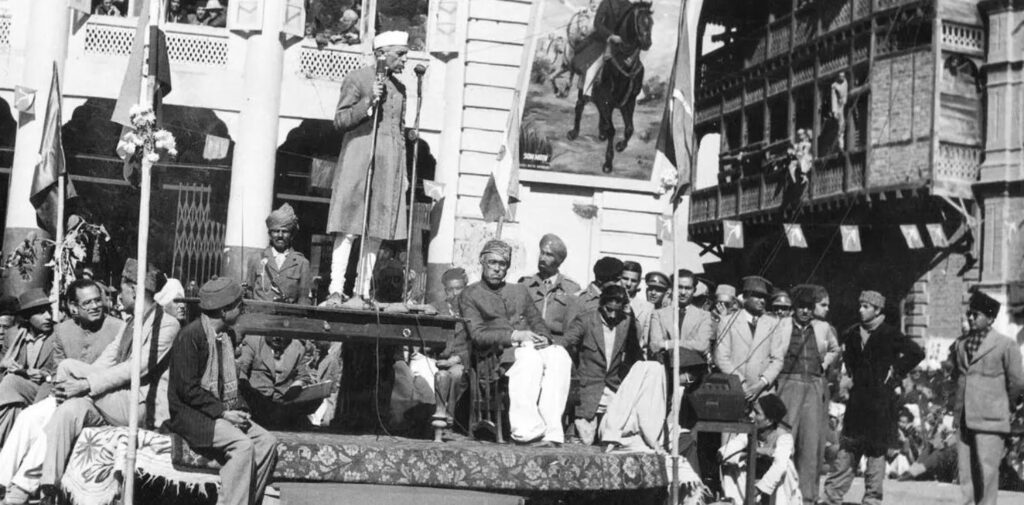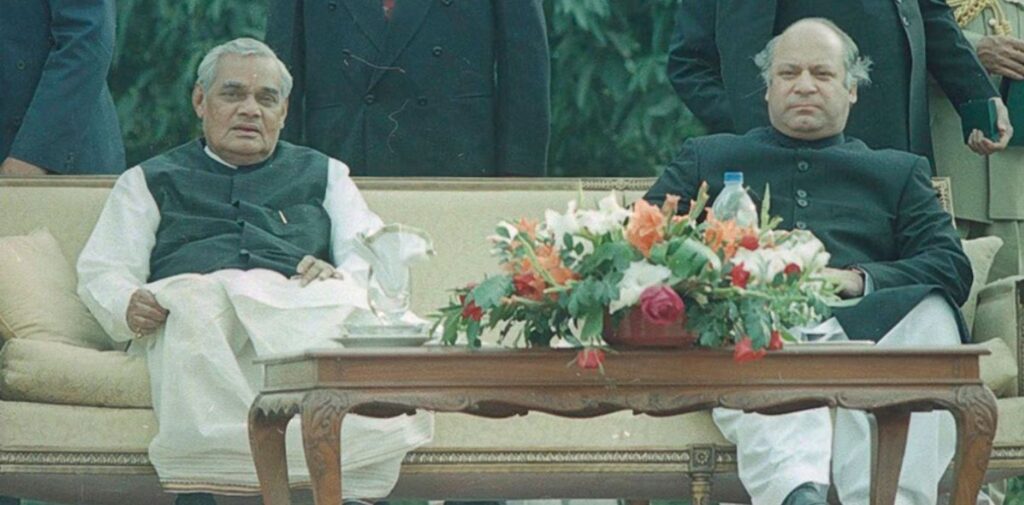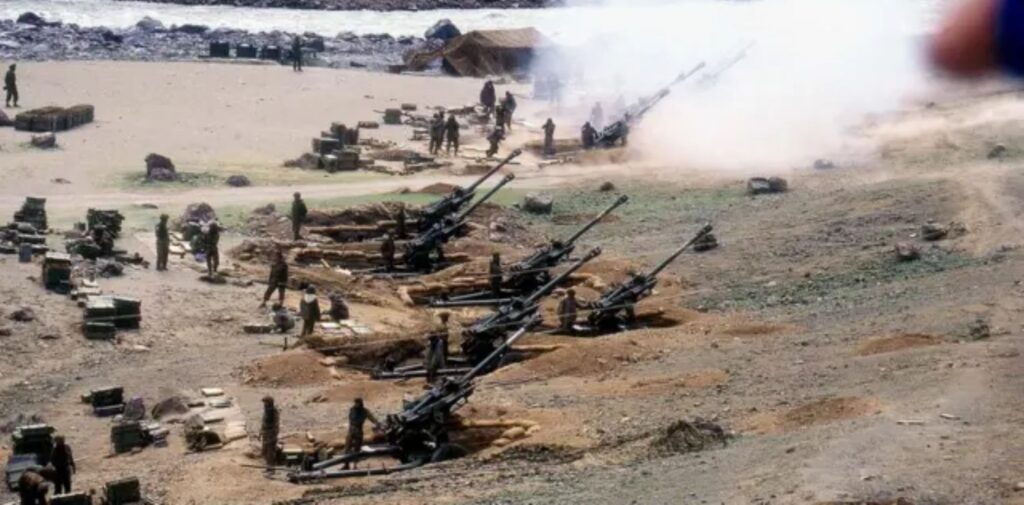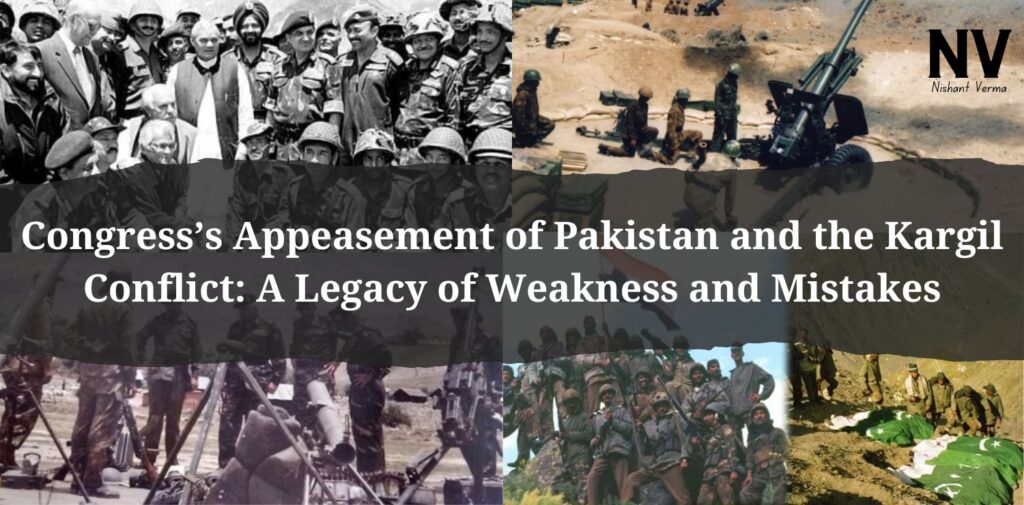The Kargil conflict of 1999 stands as one of the darkest chapters in the history of India’s relationship with Pakistan. It was a war that claimed the lives of over 500 Indian soldiers, tested the strength of India’s military, and left deep scars in the nation’s collective memory. But the most bitter part of this conflict wasn’t just the loss of brave soldiers or the threat to the sovereignty of India—it was the fact that the Kargil war was not entirely an accident. It was the culmination of a series of wrong decisions, weak policies, and appeasement toward Pakistan by the Indian National Congress, the party that ruled the country for most of the post-independence period.
The Congress-led government, under Prime Minister Atal Bihari Vajpayee’s leadership, was left to clean up the mess left by their predecessors. Congress’s soft approach towards Pakistan, especially in the 1990s, played a major role in triggering the Kargil conflict. Let’s dive deep into how this flawed policy of appeasement to Pakistan set the stage for Kargil.
The Congress Government’s Softness Toward Pakistan: A History of Mistakes
To understand how Congress’s appeasement of Pakistan led to Kargil, we need to take a look at the bigger picture. Since 1947, Pakistan has been an aggressive neighbor, often resorting to military action to achieve its goals, including the invasion of Kashmir. But despite repeated provocations, the Indian National Congress often chose diplomacy over decisive military action.
Under the leadership of Jawaharlal Nehru, India’s first Prime Minister, the Congress government followed a policy of “peaceful coexistence” with Pakistan, which was rooted in an idealistic vision of maintaining good relations with all neighbors. However, this approach failed to recognize the reality of Pakistan’s military ambitions and its constant hostility toward India.

Nehru’s Fatal Mistake: The Kashmir Issue
One of the first and most significant blunders made by the Congress was Nehru’s handling of the Kashmir issue. In 1947, when Pakistan sent its tribal forces to invade Kashmir, Nehru made the fatal mistake of taking the matter to the United Nations instead of taking swift military action. This not only allowed Pakistan to gain control over parts of Kashmir but also led to the division of the region. Nehru’s decision of offering a plebiscite (a vote by the people of Kashmir) was another major blunder, as it gave Pakistan hope that they could gain control of Kashmir through diplomatic and military means.
This set a dangerous precedent. From then on, Pakistan never took India’s efforts to maintain peace seriously. Every time there was a possibility for peace talks, Pakistan would continue its proxy war by sponsoring terrorism and infiltration in Kashmir. Yet, Congress, instead of reacting firmly, kept offering talks, making concessions, and letting Pakistan play its games.
1990s: A Period of Growing Hostility
By the time the 1990s came around, the situation had become even worse. Pakistan, under the leadership of Benazir Bhutto and Nawaz Sharif, was more determined than ever to cause trouble for India. The rise of Islamic terrorism in Kashmir, which Pakistan was directly involved in supporting, was reaching a peak.
But what did Congress do? Instead of confronting Pakistan and its terror-supporting policies, the Congress government under Prime Minister P.V. Narasimha Rao and later under I.K. Gujral, continued to appease Pakistan, hoping that diplomatic talks could solve everything. They offered trade deals, held peace talks, and, in many instances, ignored the fact that Pakistan was supporting terrorist groups like Hizbul Mujahideen and Lashkar-e-Taiba in Kashmir.

Lahore Summit: A Fatal Blow to India’s Security
The most glaring example of Congress’s misguided policies during this period was the Lahore Summit of 1999. The summit, held between Indian Prime Minister Atal Bihari Vajpayee and Pakistani Prime Minister Nawaz Sharif, was supposed to open a new chapter in the bilateral relations between the two countries. Vajpayee, in a gesture of peace, traveled by bus to Lahore, offering Pakistan an olive branch.
This moment of hope quickly turned into a disaster. While Vajpayee was embracing peace with Pakistan, Sharif was secretly plotting an invasion. Pakistan’s military, led by General Pervez Musharraf, had already started infiltrating the Kargil region in India’s Jammu and Kashmir. The Congress, which was still in power until the end of 1996, had set the tone for peace talks with Pakistan without realizing the dangers of trusting Pakistan’s intentions.
The summit’s failure showed just how naive the Congress government was in dealing with Pakistan. The very country that had just signed an agreement of peace was secretly planning to invade Indian territory. This appeasement, which sought peace at all costs, turned out to be a massive miscalculation.
The Kargil Conflict: The Consequences of Congress’s Mistakes
By the time the Kargil conflict broke out in 1999, the damage had already been done. Pakistan, having infiltrated the Kargil region, believed that India’s weak leadership would allow them to get away with it. They had no reason to believe otherwise, given that India had been so soft on them for decades.
Kargil was a direct result of Pakistan’s military strategy of bleeding India through low-cost, high-return wars. The Congress government’s failure to take strong action when Pakistan supported terrorism in Kashmir, and its attempt to normalize relations while Pakistan continued its hostile actions, left India vulnerable.
When the war broke out, it wasn’t just a military conflict. It was a wake-up call for India, showing how Pakistan’s duplicity had been underestimated. What was worse was that India had to fight on multiple fronts—defending its territory, dealing with a hostile international community, and confronting the legacy of years of weak leadership from Congress.

The Aftermath: Lessons and Accountability
The Kargil war was a lesson that should have been learned long ago. Pakistan, despite repeated attempts at peace talks, could never be trusted. Congress’s repeated concessions and failure to recognize Pakistan’s aggressive tendencies were among the primary reasons why the Kargil conflict happened.
After the war, the Bharatiya Janata Party (BJP) led by Atal Bihari Vajpayee came to power, and the approach toward Pakistan drastically changed. The BJP adopted a more firm stance, refusing to be duped by peace talks when Pakistan continued its subversive actions. Vajpayee’s government eventually took tough decisions and made it clear that India would not tolerate Pakistan’s terror-based tactics.
But the shadow of Congress’s appeasement continued to loom over India’s strategic decisions for years. The Kargil conflict showed the dangers of trusting a nation that, for decades, had been a sworn enemy of India’s peace and sovereignty.
Conclusion: Congress’s Legacy of Appeasement and Weakness
The Kargil war will always stand as a stark reminder of how Congress’s policy of appeasement towards Pakistan, rooted in misguided ideals of diplomacy, compromised India’s national security. Congress’s inability to take decisive action against Pakistan’s aggression and its persistent hope for peace through appeasement only emboldened the enemy.
India paid a heavy price for Congress’s failure to act decisively. It is a lesson that the country cannot afford to forget. Let us hope that the mistakes of the past are not repeated, and that future governments will learn from this painful chapter in history, never again compromising national security for the sake of false hopes of peace with Pakistan.




